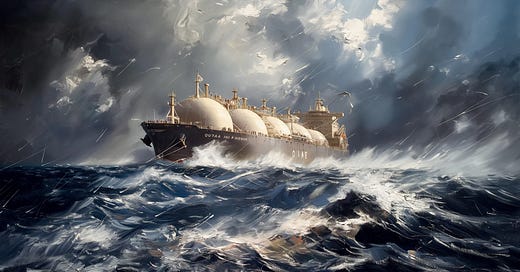In-Depth: Qatar's Quest for LNG Dominance
Exploring Qatar's strategic LNG expansions and global partnerships as it prepares to lead the future of global energy supply.
As nations face the energy trilemma—securing sustainable, affordable, and reliable energy—Qatar’s pivotal role in the global energy landscape is becoming increasingly significant. Already the world’s third-largest exporter of liquefied natural gas (LNG), Qatar is strategically expanding its reach and capabilities to secure a leading position in the evolving global market, catering to the gradual shift towards greener energy solutions.
Strategic Expansions Amidst Global Energy Transitions
QatarEnergy, the state-owned oil and gas company of Qatar, is at the forefront of significant expansion projects that are poised to increase its LNG production capabilities dramatically. The North Field expansion project is a cornerstone of these efforts, projected to boost Qatar’s LNG production from 77 million tonnes per annum (mtpa) to an impressive 142 mtpa by 2030—an almost 85% increase. This expansion not only reinforces Qatar’s commitment to dominating the LNG market but also positions it strategically as global dynamics shift towards renewable energy sources. Including expert analysis or global comparison here could elucidate Qatar’s strategic positioning against global production rates.
Deepening Global Influence Through Strategic Partnerships
In its latest move to expand its global footprint, QatarEnergy has recently secured a 40% participating interest in two exploration blocks, “Cairo” and “Masry,” offshore Egypt, in collaboration with ExxonMobil. This partnership not only extends Qatar’s exploration capabilities but also solidifies its influence across strategic geopolitical regions. His Excellency Mr. Saad Sherida Al-Kaabi, Minister of State for Energy Affairs, recently highlighted the enduring demand for oil and gas and Qatar’s commitment to responsible energy production, including initiatives like CO2 capture. Additionally, a recent agreement with Nakilat to manage nine of the world’s largest LNG vessels, the “QC-Max” class, underscores Qatar’s commitment to advancing LNG technology and capacity on a global scale.
Balancing Economic Impact with Environmental and Social Responsibilities
The economic implications of Qatar’s LNG strategy are profound, potentially bolstering the nation’s GDP significantly through substantial investment spending. However, this rapid expansion raises important questions about environmental and social impacts. As Qatar navigates its economic future, it must balance economic gains with responsible environmental stewardship and address the potential societal impacts of industrial expansion.
A Nuanced SWOT Analysis
Strengths: Qatar boasts substantial gas reserves and cost-effective production capabilities, complemented by a strategic geographic location that offers logistical advantages in key markets in Asia and Europe.
Weaknesses: A heavy reliance on hydrocarbons ties Qatar’s economy to the volatile global energy market and poses risks as the world shifts towards renewable energy sources.
Opportunities: The ongoing global energy crisis and the increasing demand for reliable energy supplies present Qatar with opportunities to secure new long-term contracts, particularly with European nations seeking to diversify their energy sources.
Threats: The global pivot towards renewable energy and the potential for an oversupplied LNG market pose significant challenges to Qatar’s long-term strategic positioning.
A Vision for the Future
Qatar’s proactive approach to expanding its LNG capabilities and forging strategic global partnerships illustrates its vision to not only lead in LNG exports but also significantly influence global energy security and economic stability. As the world transitions to a more sustainable energy future, Qatar’s strategic decisions today will likely have lasting impacts on the global energy landscape. Moving forward, Qatar must navigate the complexities of market dynamics, balancing optimistic growth with the pragmatic challenges of an evolving energy sector. This balanced approach will be crucial for Qatar as it shapes its future in the dynamic global energy market.









